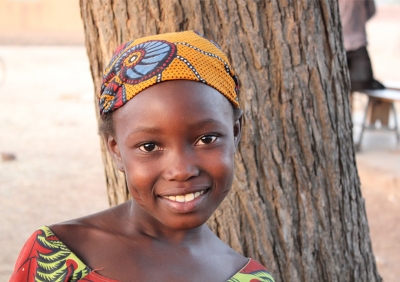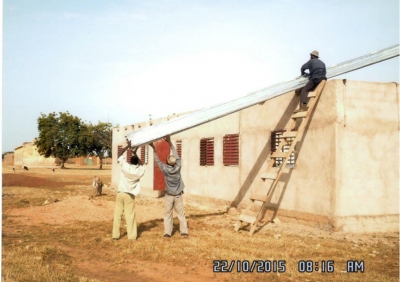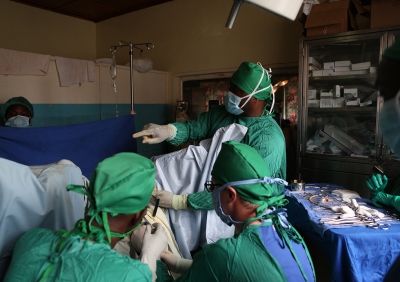Women's Rights
Improving the status of human rights for women is critical when it comes to advancing economic and social conditions in developing countries. The way this advancement should be reached is established in treaties. Here we present the most important conventions on the protection of women's rights.
Universal Declaration of Human Rights (1948)
The contents of Resolution 217 (III) of the Universal Declaration of Human Rights, which the United Nations General Assembly passed on December 10, 1948, stipulates in Article 2 that all rights and freedoms set out in the declaration are due to every human regardless of difference, especially gender. Those human rights include the rights to life, freedom, and personal safety (Article 3). The UDHR thereby constitutes a historical milestone for the forbidding of discrimination on the basis of gender.
„The human rights of women and of the girl-child are an inalienable, integral and indivisible part of universal human rights."
Declaration on the Elimination of Violence Against Women 1993 Convention on the Elimination of All Forms of Discrimination Against Women (CEDAW, 1979)
In its preamble, CEDAW recalls that "discrimination against women violates the principles of equality of rights and respect for human dignity, is an obstacle to the participation of women, on equal terms with men, in the political, social, economic and cultural life of their countries, hampers the growth of the prosperity of society and the family and makes more difficult the full development of the potentialities of women in the service of their countries and of humanity" Article 3 of this Convention stipulates that "States Parties shall take in all fields, in particular in the political, social, economic and cultural fields, all appropriate measures, including legislation, to ensure the full development and advancement of women , for the purpose of guaranteeing them the exercise and enjoyment of human rights and fundamental freedoms on a basis of equality with men." With this, the Convention overlaps with the Human Declaration of Human Rights, which regards the recognition of women's rights as human rights.
United Nations Development Fund for Women (UNIFEM, 1985/1976)
As a result of the first World Conference on Women, which took place in 1975 in Mexico under the motto "Equality, Development, Peace," the United Nations Development Fund for Women (UNIFEM) was established in 1976 with the goal of improving the situation and standard of living for women in developing countries through concrete investments and legislative action. In 1985, UNIFEM was recognized as an independent UN Organization with a seat in New York.
Declaration on the Elimination of Violence Against Women (1993)
The theme of "Violence against women" was discussed at the second United Nations Conference on Human Rights in Vienna 1993. The Viennese Declaration includes the explicit condemnation of violence against women. It established that " The human rights of women and of the girl-child are an inalienable, integral and indivisible part of universal human rights." Attached to the Human rights conference, the UN adopted in 1993 a "Declaration on the elimination of violence against women" in which, among other things, Genital mutilation and other traditional practices that are harmful and detrimental to women, as public and private violence against women, are defined as violations of human rights.
Program of Action of the Cairo International Conference on Population and Development (1994)
With the goal of implementation by the year 2015, the 179 participating states at the Cairo Conference on Population and Development adopted a plan of action that connects population, development, and women's rights, whereby access to health and family planning in particular should be made possible for everyone. The education and empowerment of women is granted a high priority. Among other things, care during pregnancy and birth as well as protection from STIs such as HIV/AIDS is emphasized.
Beijing Declaration of the World Conference on Women (1995)
At the September 1995 Fourth World Conference on Women in Peking (Beijing), the participating governments at the in September 1995 adopted the so-called "Beijing Declaration." Based on the fact that men and women are still treated unequally, and in view of the goal of actualizing the human rights of women and girls as an inalienable, integral, and indivisible part of universal human rights and basic freedoms, a platform of action for the empowerment of women was agreed upon. Under the section "Violence against Women" the action platform is against all forms of physical, sexual, and psychological violence against women, including marital rape, female genital mutilation, and other traditional practices detrimental to women, and demands that governments as well as international organizations and Non-Governmental Organisations (NGOs) undertake comprehensive protection measures. Under the section "Girls", it is explicitly stated that girls from the earliest stage of life onward, during their childhood and into adulthood, are discriminated against by widespread harmful attitudes and practices.
UN Security Council Resolution 1325 on Women, Peace, and Security (2000)
United Nations Security Council Resolution 1325 on Women, Peace, and Security (2000) The UN Security Council passed Resolution 1325 "Women, Peace, and Security" in 2000, in which the inclusion of the rights of women to protection and equal treatment in peace negotiations, conflict resolution, and reconstruction, is called for.
Maputo Protocol (2005)
At a summit meeting in Maputo, the 53 member states of the African Union (AU) adopted the protocol for the rights of women in Africa (Maputo Protocol) into the 1986 African Charter of Human and Civil Rights. In the comprehensive catalog of protected rights, under the section "Elimination of Harmful Practices" (Article 5) the goal of fighting against every form of FGM is explicitly adopted.






